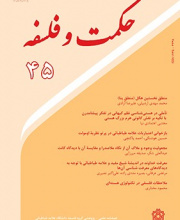
مقالات
تحلیل رویکرد کامپیوتری به فلسفه علم
حوزه های تخصصی:
رد واجب الوجود در فلسفه ی سارتر
Universalizability and Practical Identity
حوزه های تخصصی:
A familiar criticism of Kant, made by Hegel and his followers, J .S. Mill and others, is that there are no maxims that are in fact contradictory, as required for morality on Kant's view. In this paper, I discuss the suggestion that our capacity for rational reflection itself implies universality, and that it is this universality that obliges us to act morally. I consider the idea that self-understanding depends upon practical identity, and I argue that we are sometimes obliged to act morally because of the nature of practical identity and its role in deliberation and self-awareness.
Kant on the Rationality of Moral Judgment
حوزه های تخصصی:
The paper deals with Kant's conception of moral judgment. I start by criticizing a dominant interpretation of Kant's practical rationality in its assertion that choosing, i.e. exercising judgment consists in adopting a maxim; and adopting a maxim is equivalent to acting on a principle, giving oneself the moral law (Korsgaard). According to this view, the logical inescapability of choosing alivqys already places us within the normative realm. I argue that there is a further function suppressed by this view, which can be termed as approval. This takes us to the further acknowledgement that the core of Kant's practical rationality, that is, the moral question itself, is not simply one of moral knowledge [Wissen], but a broader one of cognition in general [Erkenntnis].
Kant's Four Notions of Freedom
حوزه های تخصصی:
Four different notions of freedom can be distinguished in Kant's philosophy: logical freedom, practical freedom, transcendental freedom and freedom of choice ("Willkiir"). The most important of these is transcendental freedom. Kant's arguments for its existence depend on the claim that, necessarily, the categorical imperative is the highest principle of reason. My paper examines how this claim can be made plausible.
Kant: Friend or Foe of the Believer? Plantinga and Other American Christian Responses to Kant's Epistemology
حوزه های تخصصی:
Plantinga, Wolterstorff and Westphal are three eminent Christian Philosophers in the United States today. This paper will examine Plantinga, Wolterstorff, and Westphal's response to Kant's anti-realist epistemology. While perhaps many Christian philosophers doing philosophy of religion in the United States follow the common-sense realism of Thomas Reid, some philosophers, like Merold Westphal, support a Christian-Kantian-Creative-Anti-Realism. I will criticize Plantinga's and Wolterstorff's position, and support Westphal's, arguing that Kant's epistemology does not harm religious belief but in fact supports it